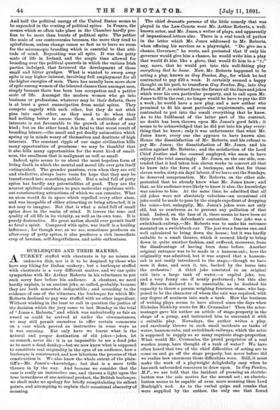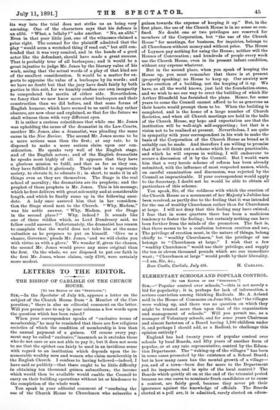BURLESQUES AND THEIR MAKERS..
ATURKEY stuffed with chestnuts is by no means an unknown dish, nor is it to be despised by those who have any liking for Italian cookery ; but a burlesque stuffed with chestnuts is a very different matter, and we can quite sympathise with Mr. Arthur Roberts in his reluctance to put such sorry fare before his audience. A chestnut, we need
hardly explain, is an ancient joke, so called, probably, because they are both somewhat indigestible ; and according to the evidence of one of the witnesses, the burlesque for which Mr. Roberts declined to pay was stuffed with no other ingredient.
Without wishing in the least to call in question the justice of the decision which the jury came to last Monday in the trial of "Jones v. Roberts," and which was undoubtedly as fair an award as could be arrived at under the circumstances, we may still permit ourselves to offer certain comments on a case which proved as instructive in some ways as it was amusing. Not only have we learnt what is the natural and proper destination of old jokes—jokes, let us remark, never die : it is as impossible to see a dead joke as to meet a dead donkey—but we now know what is supposed to constitute real originality in the eyes of an audience, how a burlesque is constructed, and how laborious the process of that construction is. We also know the whole extent of the plain- tiff's—Mr. Jones's—knowledge ; but that is a mere trifle thrown in by the way. And because we consider that the case is really an instructive one, and throws a light upon the true inwardness of one national product, the British burlesque, we shall make no apology for briefly recapitulating its salient points, and attempting to explain their occasional obscurity of meaning.
The chief dramatis persons of the little comedy that was played in the Law-Courts were Mr. Arthur Roberts, a well- known actor, and Mr. Jones, a writer of plays, and apparently of impassioned letters also. There is a real touch of pathos in the letter which Mr. Jones addressed to Mr. Roberts, when offering his services as a playwright. "Do give me a chance, Governor," he wrote, and protested that if only his governor would give him a chance, he would write him a play that would fit him like a glove, that would fit him to a "t ;" nay, more, that he would put into this well-fitting play everything that he knew. Now, Mr. Roberta happened to be acting a play, known as Guy Fawkes, Esq., for which he had contracted to pay 220 a week. It certainly seemed a happy thought on his part, to transform Guy Fawkes, Bag., into Guy Fawkes, MY., to subtract from the former all the lines and jokes which were his own particular property, and to call upon Mr. Jones to fill in the rest ; no longer would he have to pay the 220 a week ; he would have a new play, and a new author who promised to fit his most particular requirements, and even contracted to put into the result everything that he knew. As to the fulfilment of the latter part of the contract, no doubt has been thrown upon Mr. Jones's good faith ; it seems to be acknowledged that he did put into his play every- thing that he knew; only it was unfortunate that what Mr. Jones knew, every one else appears to have known also. Hence the dissatisfaction of Mr. Roberts, and his refusal to pay Mr. Jones ; the dissatisfaction of Mr. Jones, and his action against Mr. Roberts ; and the satisfaction of the Lord Chief Justice and the counsel employed, who seem to have enjoyed the trial amazingly. Mr. Jones, on the one side, con- tended that it had taken him eleven weeks to convert all that he knew into the form of a burlesque, and that for those eleven weeks, sixty-six days' labour, if we leave out the Sundays, he deserved compensation. Mr. Roberts, on the other side, protested that he already knew what Mr. Jones knew; and that, as his audience were likely to know it also, the knowledge was useless to him. At the same time, he admitted that all old jokes were not absolutely valueless—an occasional old joke could be made to pass by the simple expedient of dropping the voice—but, unhappily, Mr. Jones's jokes were not only old, but so cumbrous as to prevent any palliation of that kind. Indeed, on the face of it, there seems to have been no little truth in the defendant's contention. One joke was a switchback-railway,—Mr. Roberts was to make his entrance mounted on a switchback-car. The jest was a famous one, and well calculated to bring down the house ; but it was hardly suitable to a small theatre, which it seemed likely to bring down in quite another fashion, and suffered, moreover, from the disadvantage of having been done before. Another original entrance was to be made in a hansom-cab ; here the originality was admitted, but it was argued that a hansom- cab is not easily introduced to the stage,—though we have seen it done, and seen it, too, backed by the horse into the orchestra! A third joke consisted in an original exit into . a large tank of water,—a capital joke, too, and a very funny one if neatly performed ; but this also Mr. Roberts declared to be unsuitable, as he doubted his capacity to throw a person weighing fourteen stone, who hap- pened to be the character of whom the exit was required, with any degree of neatness into such a tank. How the business of writing plays seems to have altered since the days when Nicholas Nickleby wrote for Mr. °rummies I Then the actor- manager gave his author an article of stage-property in the shape of a pump, and instructed him to surround it with a suitable play. Nowadays, the author writes a play, and carelessly throws in such small incidents as tanks of water, hansom-cabs, and switchback-railways, which the actor is supposed to supply as so many requisite stage-properties. What would Mr. °rummies, the proud proprietor of a real wooden pump, have thought of a tank of water? We have often heard that two of the chief difficulties of acting are to come on and go off the stage properly, but never before did we realise how enormous those difficulties were. Still, it must make the work of a playwright delightfully easy when he has such unbounded resources to draw upon. In Guy Fawkes, M.P., we are told that the incident of pressing an electric- button was the sole motive for the second act ; an electric- button seems to be capable of even more meaning than Lord Burleigh's nod. As to the verbal quips and cranks that were supplied by the author, the only one that found
its way into the trial does not strike us as being very amusing. One of the characters says that his defence is an alibi. "What, a lullaby ?" asks another. "No, an alibi." Even in that poor little jest, one of the witnesses claimed a prior right. The counsel for the plaintiff admitted that the play "would seem a wretched thing if read out," but still con- tended that it was very comical, and in the hands of a good actor like the defendant, should have made a great success. That is probably true of all burlesques; and it would be a great injustice to judge Mr. Jones by the literary value of his work, seeing that the actual words of a play of that kind are of the smallest consideration. It would be a matter for ex- perts to appraise the value of a burlesque by its words ; and we have no doubt but that the jury have dealt fairly by both parties in this suit, for we humbly confess our own incapacity to comprehend the merits of either side. Nevertheless, we fancy that we now know more about burlesques and their 'construction than we did before, and that some forms of English humour, which have seemed to us until to-day rather obscure, are now clear and explained, so that for the future we shall witness them with very different eyes.
It is rather a curious coincidence that while one Mr. Jones was upholding the cause of the dramatist in the Law-Courts, another Mr. Jones, also a dramatist, was pleading the same cause in the New Review. The second Mr. Jones seems to be a more serious man than the first ; at any rate, he is disposed to make a more serious claim upon our con- sideration. He speaks very well of the English stage, and of the English actors; and of the English dramatists he speaks most highly of all. It appears that they have a glorious mission to fulfil, and that as far as they can, they have fulfilled it gloriously. Their task is to regenerate society, to elevate it, to educate it ; in short, to make it in all things even as they are themselves. The Stage is the real school of morality; the dramatists are its prophets ; and the prophet of these prophets is Mr. Jones. This is his message, which he first delivers with great solemnity and at considerable length, and which be finally sums up in the following anec- dote. A lady once assured him that in her considera- tion the Stage stood next to the Church. "Why, Madam," was his noble answer, "Why, Madam, put the Stage in the second place ? " Why, indeed ? It sounds like one of those riddles which, as Lord Dundreary said, no fellow could answer. Unfortunately, the dramatist has reason to complain that the world does not take him at the same valuation as he proposes to put on himself. Give us a chance, Governor,' pleads Mr. Jones, and we will clothe you with virtue as with a glove.' We wonder if, given the chance, the second Mr. Jones would prove any more original than the first. On the whole, we are disposed to put our faith in the first Mr. Jones, whose claims, only £100, were certainly more modest.



































 Previous page
Previous page